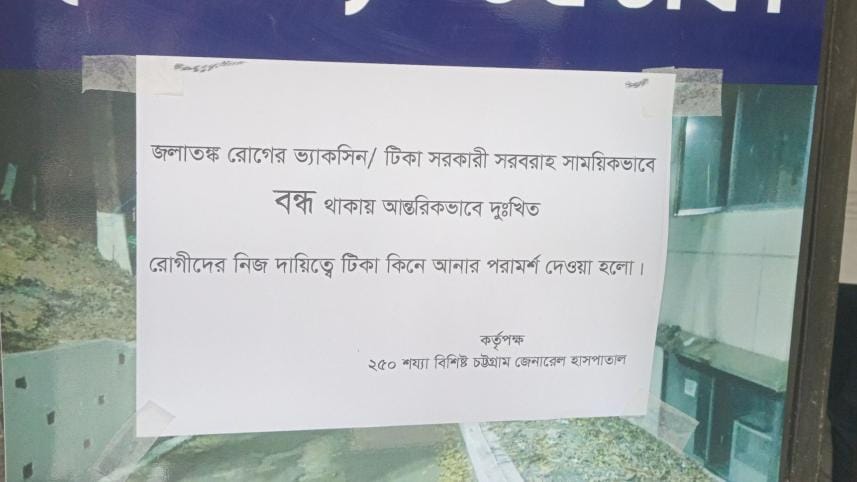Rising pet bites strain rabies vaccine supply in Chattogram

A surge in pet bite cases has significantly strained the rabies vaccination system in Chattogram, causing frequent vaccine shortages and leaving patients in distress.
Rabies vaccines are normally available free of cost at Chattogram General Hospital (CGH) and the Bangladesh Institute of Tropical and Infectious Diseases (BITID) in Fouzdarhat. However, the rising demand, driven by an increase in pet bite cases, has overwhelmed these facilities.
Patients in distress
Last Saturday and Sunday, CGH ran out of vaccines, forcing patients to buy them from outside. This created a financial burden for many, particularly low-income families.
Rasheda Akter, a resident of Chattogram, rushed her 10-year-old son to CGH after a stray dog bite but was met with a chilling notice: the hospital had no vaccines.
"The doctors said I had to buy the vaccine from outside," she said. "But how can I? My husband is a rickshaw puller, and every penny counts."
The hospital resumed free vaccination on Monday, said Rupa Dutta, emergency medical officer of CGH. She acknowledged the shortage and added that notices are posted to inform patients during supply disruptions.
According to sources, vaccine shortages occur almost every month at CGH. In October, the supply was disrupted for nearly 10 days, leaving patients vulnerable.
Rabies, a fatal zoonotic disease transmitted through the bite of infected animals, can only be prevented with timely vaccination.
"An animal-bite patient should take three doses within the first week after being bitten," said Abdul Mannan, superintendent of CGH.
While rabies vaccines cost Tk 450 per vial in the market, patients with severe bites often require rabies immunoglobulin, which costs Tk 700 per vial. These treatments are usually supplied free of cost but are often unavailable due to supply shortages, forcing patients to purchase them.
Superintendent Mannan attributed the shortages to insufficient vaccine supplies from the Central Medical Store Depot (CMSD).
"We need 60 vials a day but only receive 700-1,000 vials against a requisition for 5,000," he said.
CMSD Assistant Director Nazrul Islam said they distribute vaccines based on the Directorate General of Health Services' (DGHS) recommendations.
Forhad Hussain, director of disease control at DGHS, told The Daily Star that the delays stem from the end of the Health Population and Nutrition Sector Programme (HPNSP) in July last year.
However, he added that an emergency fund has been approved, and vaccines will soon be procured through a government tender.
"We have some vaccine in our store which will meet the demand during this time," he said.
Rise in pet bites
BITID reported vaccinating 13,000 people against rabies last year, with 70 percent of cases linked to pet bites. Similarly, CGH vaccinated 23,983 individuals, of whom 69.34 percent were pet bite victims. This trend continued in January, with 63 percent of the 540 individuals vaccinated between January 21 and 27 at CGH being pet bite victims.
"Almost 70 percent of total patients are now victims of pet bites," said superintendent Mannan.
"Earlier, the ratio was 20:80 between pet bites and stray animal bites," he added.
Pet vaccination still vital
Vaccinating pets significantly reduces the risk of rabies but does not eliminate it entirely, said Paritosh Kumar Biswas, a professor at Chattogram Veterinary and Animal Sciences University.
"Even if a pet is vaccinated, there's still a possibility of infection if bitten or scratched," he said, stressing the importance of post-exposure prophylaxis for all animal bite victims.
Remote areas in Chattogram face an added challenge as rabies vaccines are only available at CGH and BITID.
"This limited access puts rural populations at greater risk," said Jahangir Alam, civil surgeon of Chattogram. He acknowledged the need for expanded vaccination facilities and pledged to raise the issue with the Ministry of Health.
Md Alamgir, Chattogram district livestock officer, said pet ownership has increased in recent years. At present, there are around 100,000 pet animals in Chattogram, adding that the number was around 5,000 five years ago.




 For all latest news, follow The Daily Star's Google News channel.
For all latest news, follow The Daily Star's Google News channel.
Comments